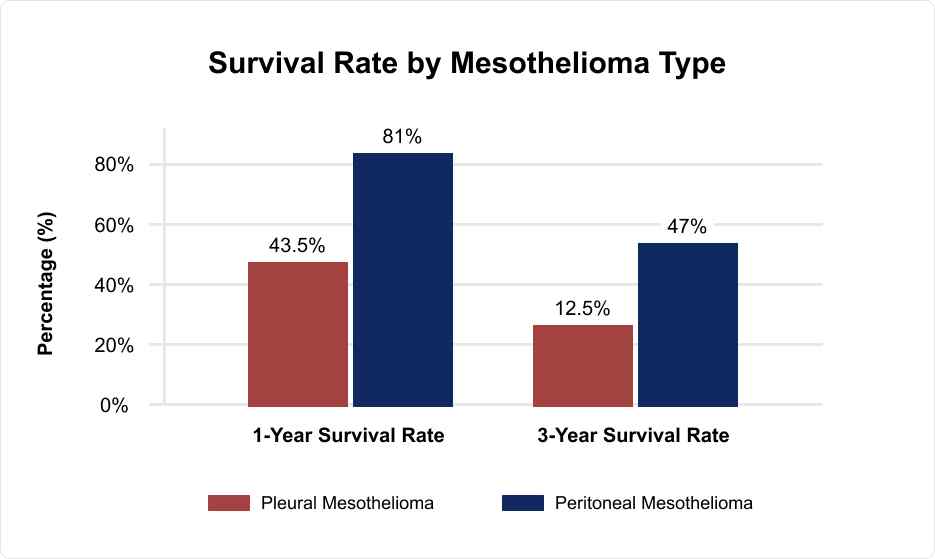The overall 5-year mesothelioma survival rate, or percentage of patients still alive after 5 years, is 12%. Pleural mesothelioma has a 1-year survival rate of 43.5%, while peritoneal mesothelioma has a 1-year survival rate of 81%. We can help you get medical care that may improve your survival time.
What Is the Survival Rate of Mesothelioma?
Survival rate refers to the number of mesothelioma patients still living after a set amount of time, typically years. It is part of a mesothelioma prognosis (expected health outlook).
Mesothelioma generally has poor long-term survival rates. However, some patients have outlived these estimates with the help of top doctors and treatments.

If you or a loved one is a U.S. veteran with mesothelioma, we may be able to help you find top doctors and treatments to improve your survival rate.
Get a Free Veterans Packet to learn more about mesothelioma survival rates and health care options that may be able to help you live longer.
Factors Affecting Mesothelioma Survival Rates
Many different factors, like cancer spread and a patient’s overall health, can impact malignant mesothelioma survival rate. View notable factors below.
Type of Mesothelioma
Mesothelioma can develop in the lining of the lungs, abdomen, heart, and testicles. Some types of mesothelioma are easier to treat, meaning patients may have better survival rates.
| Type of Mesothelioma | 5-Year Survival Rate |
|---|---|
| Pleural mesothelioma | 12.5% |
| Peritoneal mesothelioma | 47% |
| Pericardial mesothelioma | 9% |
| Testicular mesothelioma | 49% |
Sources: Applied Sciences (2021), Cancer Management and Research (2019), Advances In Anatomic Pathology (2023), & Urology (2019)
Contact us now for help finding treatment options that may improve your mesothelioma survival rate, no matter your type.
Mesothelioma Survival Rate by Stage
Pleural mesothelioma has four stages. Early stages of mesothelioma (1 and 2) have higher survival rates than later stages (3 and 4) because they’re easier to treat.
| Stage | 1-Year Survival Rate | 5-Year Survival Rate |
|---|---|---|
| Stage 1 mesothelioma survival rate | 50.5% | 5.3% |
| Stage 2-3 mesothelioma survival rate | 42.8% | 3.0% |
| Stage 4 mesothelioma survival rate | 36.9% | 4.9% |
Source: ASCO Journal of Clinical Oncology (2024)
Other types of mesothelioma don’t have official stages. In these cases, survival rates are higher when the cancer hasn’t spread.
Survival Rates by Mesothelioma Cell Type
Cell type refers to the cancer cells found in a mesothelioma tumor. The three main mesothelioma cell types are epithelioid, sarcomatoid, and biphasic.
Epithelioid mesothelioma has the best survival rate since these cells are easier to treat than the others.
| Mesothelioma Cell Type | 2-Year Survival Rate | 5-Year Survival Rate |
|---|---|---|
| Epithelioid mesothelioma | 45% | 14% |
| Sarcomatoid mesothelioma | 15% | 4% |
| Biphasic mesothelioma | 22% | 5% |
Source: National Cancer Database (NCDB) (2022)
Doctors can recommend treatments for any cell type you have to hopefully improve your mesothelioma survival rate.
Gender
Women with mesothelioma have higher mesothelioma survival rates than men.
A report from the Annals of Thoracic Surgery found that women with mesothelioma had a 5-year survival rate of 13.4% — over 3 times greater than the 5-year survival rate of men, which was 4.5%.
Higher estrogen levels and lower rates of asbestos exposure (the only known cause of mesothelioma) may be why women have a better survival rate and overall prognosis.
Age
Younger patients have better survival rates for mesothelioma, in part because they’re usually in better overall health and can undergo aggressive treatments.
| Age Group | 5-Year Survival Rate |
|---|---|
| 50 and Younger | 42.1% |
| 50-64 | 16% |
| 65 and Older | 7.7% |
| All Ages | 11.5% |
Source: National Cancer Institute SEER program
Most patients are diagnosed with mesothelioma at the age of 65 or older, leading to less favorable survival times.
Race
The NCI found that white Americans had lower survival rates than many other races.
| Race | 5-Year Survival Rate |
|---|---|
| Asian/Pacific Islander | 9% |
| Black | 14% |
| Hispanic | 11.3% |
| White | 11% |
Source: National Cancer Institute SEER program
White Americans worked in industries that relied on asbestos-based products more than other races.
Pleural Mesothelioma Survival Rates
Malignant pleural mesothelioma forms in the lung lining (pleura) and is the most common type of this cancer.
Here are malignant pleural mesothelioma survival rates:
- 1-year survival rate: 43.5%
- 2-year survival rate: 23.6%
- 5-year survival rate: 12.5%
Doctors can recommend treatments like surgery, chemotherapy, and immunotherapy to help pleural mesothelioma patients live longer.
Peritoneal Mesothelioma Survival Rates
Malignant peritoneal mesothelioma develops in the lining of the abdomen (peritoneum). It is the easiest type to treat, so these patients have the best overall survival rates.
Here are peritoneal mesothelioma cancer survival rates:
- 1-year survival rate: 81%
- 2-year survival rate: 60%
- 5-year survival rate: 47%
Peritoneal mesothelioma patients can undergo treatments like abdominal surgery and heated chemotherapy to potentially outlive average survival rates.
Survival Rates of Rare Mesothelioma Types
Mesothelioma can also develop in the heart lining, which is called pericardial mesothelioma, or the testicle lining, which is called testicular mesothelioma.
Here are the survival rates for these types:
- Pericardial mesothelioma: The 1-year survival rate is 22%, according to a 2023 Advances In Anatomic Pathology study. The 5-year survival rate is 9%.
- Testicular mesothelioma: The 5-year survival rate is 49%, and the 10-year survival rate is 33%, as noted in a report from Urology.
Pericardial mesothelioma is the hardest type to treat, while testicular mesothelioma can often be effectively treated with surgery.
Mesothelioma Survival Rates and Treatment
Treatment to destroy or remove cancer tumors is the most effective way to improve mesothelioma survival rates. Find out about top mesothelioma treatments that could help you live longer below.


Mesothelioma Survival Rate After Surgery
Different mesothelioma surgeries can greatly improve survival rates. With them, doctors can take out all visible cancer tumors.
Find out more about mesothelioma survival rates for top surgeries:
- Cytoreductive surgery with HIPEC treats peritoneal mesothelioma by extracting abdominal tumors and then applying chemotherapy. The 5-year survival rate is 80%, according to a 2022 Journal of Clinical Haematology report.
- Extrapleural pneumonectomy (EPP) treats pleural mesothelioma by removing a lung, the lung lining, and cancer tumors. The 1-year survival rate is 82%, and the 5-year survival rate is 24%.
- Pleurectomy with decortication (P/D) treats pleural mesothelioma by removing the lung lining and tumors but sparing both lungs. The 2-year survival rate is 70%, as noted in a 2022 Journal of Thoracic and Cardiovascular Surgery study.
Doctors typically use surgeries for early-stage mesothelioma cancer patients since the tumors are contained to one part of the body.
Get a Free Veterans Packet to learn more about surgeries and other treatments that could potentially improve your mesothelioma survival rate.
Mesothelioma Survival Rates for Other Treatments
In addition to surgery, many other treatments can help improve mesothelioma survival rates.
These treatment options include:
- Chemotherapy destroys cancer cells. The 1-year survival rate of pleural mesothelioma treated with chemotherapy is 58%, according to a study from OncLive.
- Radiation is beams of energy that kill cancer. The 2-year survival rate was 26% among mesothelioma patients treated with radiation, according to 2022 NCDB data.
- Immunotherapy boosts the body’s immune response to cancer. In the recent PrE0505 trial, the 1-year survival rate for mesothelioma patients treated with immunotherapy was 70.4%.
- Clinical trials test new and possibly better treatments. A Photochemistry and Photobiology study noted that photodynamic (light-based) therapy and proton therapy led to a 1-year survival rate of 58% in pleural mesothelioma patients.
Mesothelioma doctors can recommend the best treatment plan to help improve your survival time, depending on the unique factors in your case.
Mesothelioma Survival Rates Without Treatment
Patients with mesothelioma have lower survival rates if they do not get treated. The average 3-year survival rate is 7.9%, and the 5-year survival rate is 5%.
Mesothelioma patients are highly encouraged to get cancer treatments to live as long as possible.
U.S. Veterans Who Outlived Mesothelioma Survival Rates
It may be possible for you or a veteran that you love to outlive the average mesothelioma survival rates. Learn about U.S. veterans with mesothelioma who defied the odds and lived longer below.


Art Putt
- Branch: U.S. Army and U.S. Air Force
- Prognosis: 6 months to 1 year
- Survival Time: 6+ years
Diagnosed in 2018, Art is still living happily thanks to chemotherapy, immunotherapy, and holistic treatments.


Ernie Conry
- Branch: U.S. Army
- Prognosis: 12-21 months
- Survival Time: 7 years
Following his pleural mesothelioma diagnosis, Ernie underwent multiple treatments like surgery, chemotherapy, and radiation to live longer.


Walter Twidwell
- Branch: U.S. Navy
- Prognosis: 1 year or less
- Survival Time: Over 2 years
Even though Walter decided against major treatments, he still fought mesothelioma and lived longer than expected.
Get our Free Mesothelioma Kit to view available treatments that may improve your survival.
Get Help Improving Your Mesothelioma Survival Rate
U.S. veterans with mesothelioma deserve to get the best care so they can live as long as possible with this cancer.
The Mesothelioma Veterans Center can help you or a veteran you love access medical care that may allow you to live longer.
Work with our team to:
- Connect with top doctors near you for free
- File for VA health care benefits
- Pursue financial compensation for treatments
Call (877) 450-8973 now to speak to our on-staff registered nurses and veterans advocates. We’re here to help you in any way we can.
Mesothelioma Survival Rates FAQs
Is mesothelioma life-threatening?
While mesothelioma is life-threatening and survival rates are low, some people have lived for 20 years or more with this cancer.
The best way to work toward becoming a mesothelioma survivor is to get treatment. Treatments allow doctors to remove or destroy mesothelioma tumors, so you can hopefully live longer and with a higher quality of life.
What are the odds of beating mesothelioma?
The odds of beating mesothelioma are low but not impossible. Many U.S. veterans and civilians have outlived average survival rates thanks to treatments from top doctors.
“There’s a misconception that mesothelioma is this death sentence. It's not,” says Dr. Raja Flores, who has been treating this cancer for over 30 years. “Yes, a lot of patients do die from it, but you're not guaranteed to die if you have mesothelioma.”
What is the mesothelioma 5-year survival rate?
The average 5-year mesothelioma survival rate is 12%, according to the American Cancer Society (ACS). This means that 12% of patients are still alive 5 years after a diagnosis.
However, you or a veteran you love may be able to live for 5 years or even longer with mesothelioma, depending on how the cancer responds to treatments.
Contact us now to explore treatments that could improve your mesothelioma survival rate.
Is survival rate different from life expectancy?
Yes. Mesothelioma life expectancy measures how long patients can expect to live (usually in months or years) following a diagnosis. The average life expectancy for mesothelioma is 12-21 months.
Mesothelioma cancer survival rates measure the number of patients who survive for a certain amount of time after diagnosis.
How can I improve my mesothelioma survival rate?
You can potentially improve your mesothelioma survival rate by getting treatments like surgery, chemotherapy, and radiation to kill cancer cells and destroy tumors.
Call our registered nurses at (877) 450-8973 now to find doctors and treatments that may improve your mesothelioma survival rate. There’s no cost to speak with our team.


